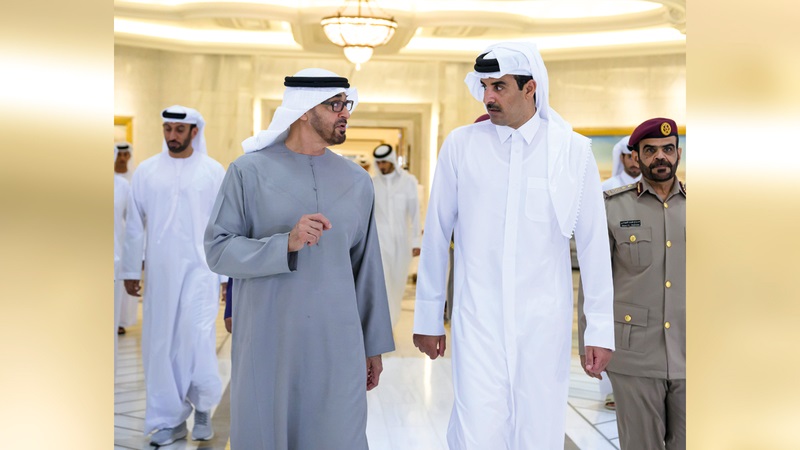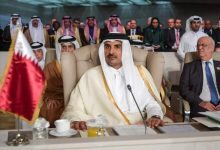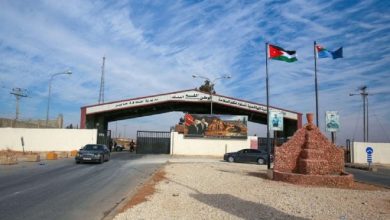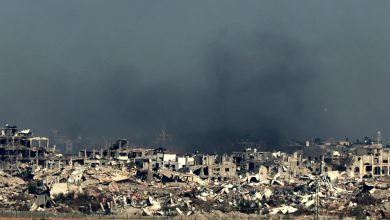Qatar’s National Day: A Remarkable Shift in UAE-Qatar Relations and the Unraveling of the Blockade Plan

Watan-The leaders of the United Arab Emirates, led by Sheikh Mohammed bin Zayed Al Nahyan, the President of the State, extended congratulations to the Emir of Qatar, Sheikh Tamim bin Hamad Al Thani, on the occasion of the National Day of his country, which falls on December 18 every year.
This “exceptional” congratulatory message, along with the celebration of the Emir of Qatar, whom Mohammed bin Rashid, the ruler of Dubai, described as “his brother with wise leadership,” prompted some to look back a few years and recall what Abu Dhabi did against Doha in an attempt to overthrow its ruler in 2017.
At that time, the UAE, along with Saudi Arabia, led an unjust blockade against Qatar, which Doha overcame with skillful diplomacy acknowledged by all. This crisis left a significant wound that has not fully healed despite the “forced” reconciliation between the Gulf countries and the Al Ula Agreement, which was largely imposed on the blockading countries after their failure to implement the planned actions against Qatar.
Sheikh Mohammed bin Zayed Al Nahyan, the President of the UAE, sent a message to Sheikh Tamim through the “Ex” platform, saying, “I congratulate my brother Sheikh Tamim bin Hamad and the brotherly Qatari people on the National Day, wishing the State of Qatar continuous progress and prosperity.”

In a significant shift in policies towards Qatar between the past and the present, the UAE President stated, “Emirati-Qatari relations are fraternal and deeply rooted. We are working together to enhance and expand them in various fields, bringing goodness and prosperity to both countries and their brotherly peoples.”
An exceptional congratulation to Qatar and its Emir, unlike any other!
In another message from the ruler of Dubai, Sheikh Mohammed bin Rashid Al Maktoum, the second man in the country, it was stated: ‘Every year, and the brotherly people of Qatar are in well-being, glory, and security on the occasion of the Qatari National Day under the wise leadership of my brother Sheikh Tamim bin Hamad Al Thani.

And Al Makto
um added, ‘May God preserve the good for them… and may He preserve the love between the two peoples… and may He maintain the stability and prosperity of our Gulf and our Arab and Islamic nation.’
It is worth mentioning that in June 2017, Saudi Arabia, the UAE, Bahrain, and Egypt severed ties with Qatar and imposed a land and air blockade on Doha, alleging its ‘support for terrorism.’
However, according to reports from Western newspapers, including The Guardian, the blockade countries grew tired of Qatar’s resilience and were forced into reconciliation without much choice. They spoke about the wounds that will remain despite Abu Dhabi and Riyadh’s attempts to show otherwise.
According to experts, such messages may superficially indicate a shift in the UAE’s foreign policy in its relations with other countries. Still, the Carnegie Research Institute has consistently affirmed that this is not true.
It is well-known that the authorities in the UAE govern the country with an iron fist, and no one can express criticism towards the leadership or heads of state. The existence of ‘prisoners of conscience’ serves as clear evidence of this, confirming that transgressions and insults against the leaders of Qatar by Emirati figures such as Al Mazrouei were given the green light by the Abu Dhabi regime and directly sanctioned by Mohammed bin Zayed.
Questions were raised following the Emirati-Saudi-Qatari reconciliation about the fate of the 13 demands imposed by the blockading countries on Qatar during the blockade that began in 2017.
Abu Dhabi Relinquishes 13 Conditions for Lifting the Blockade!
At that time, the Washington Post quoted an official in the Trump administration, the President of the United States at the time, who was familiar with the behind-the-scenes of the reconciliation negotiations, saying that the quartet of blockading countries agreed to abandon the list of 13 conditions.
Among the prominent conditions was the closure of Al Jazeera channel, Qatar reducing its cooperation with Iran, and the closure of the Turkish military base in Doha.
As for the reciprocal gesture made by Qatar, it was only the agreement to freeze the legal proceedings it had initiated against the blockading countries.
It is noteworthy that the final statement of the ‘Al Ula Agreement,’ which resolved the Gulf crisis, came without the inclusion of the 13 conditions.
How did Qatar thwart the blockade plan?
It is worth mentioning that the blockade axis had no goals in its sudden move in 2017 other than to overthrow Qatar and completely subjugate its will to the leaders of the blockade camp.
With the resilience of the Qatari people and its leadership against this plan, and with the activation of the Turkish-Qatari military agreement and Trump’s reversal of his position at the beginning of the blockade, as well as the intervention of Kuwait as a mediator to resolve the crisis, all of this led to confusion in the blockade camp and prolonged the crisis beyond what was expected.
This forced them to present a list of demands to end the crisis under the pretext of respecting Kuwaiti mediation. It seemed strange and complicated, prompting bewilderment and questioning. What happened overnight to overturn all the balances and considerations, and to overthrow all the constants and calculations that brought together the Gulf states and the alliance of the one Gulf family?
At that time, the answer could be found in the fact that Saudi Arabia, led by its new leader Mohammed bin Salman, who recently ascended to power, had arranged many of its files influenced by the presence of US President Trump and his orientations. It thought that, after organizing the Gulf summit with Trump and the billions it poured into it, it had ensured the allegiance of the largest country in the world, and that it could release its grip and act in the region as it pleased.
Riyadh, along with other blockade countries, harbored a desire to settle old scores with Qatar due to its support for the Arab Spring revolutions and Al Jazeera’s coverage of events, standing with the aspirations of Arab peoples towards independence, freedom, and social justice.”






